
Getting married in Mexico is 100% legal for U.S. citizens, but only civil ceremonies are officially recognized.
You’ll need passports, a few legal documents, and in some cases, blood tests to register your marriage. Many Americans skip the red tape by doing a symbolic ceremony instead.
The right choice depends on your background, your goals, and your legal plans after the wedding:
- U.S.-born children of Mexican parents might use their wedding as part of reclaiming Mexican nationality.
- Adults rejected by the consulate could benefit from a legal marriage as a new path to recognition.
- Parents of U.S.-born kids often want their Mexican marriage legally recognized to secure nationality for their children.
- Spouses of Mexican citizens may qualify for temporary residency or even citizenship through marriage.
- Mexican-Americans seeking dual nationality might see a Mexico wedding as step one toward a cross-border lifestyle.
No matter your path, it's vital to recognize the difference between symbolic and legal marriages, what paperwork you’ll need, and how your decision affects things like U.S. name changes, travel, and family benefits.
If you want to avoid the stress of navigating two legal systems, our team can help. We guide clients through legal marriages, cross-border paperwork, and even citizenship, all without a single consulate visit.
Want to know exactly how to get married in Mexico, step-by-step? You’re in the right place.
Let’s walk through everything you need to know next.
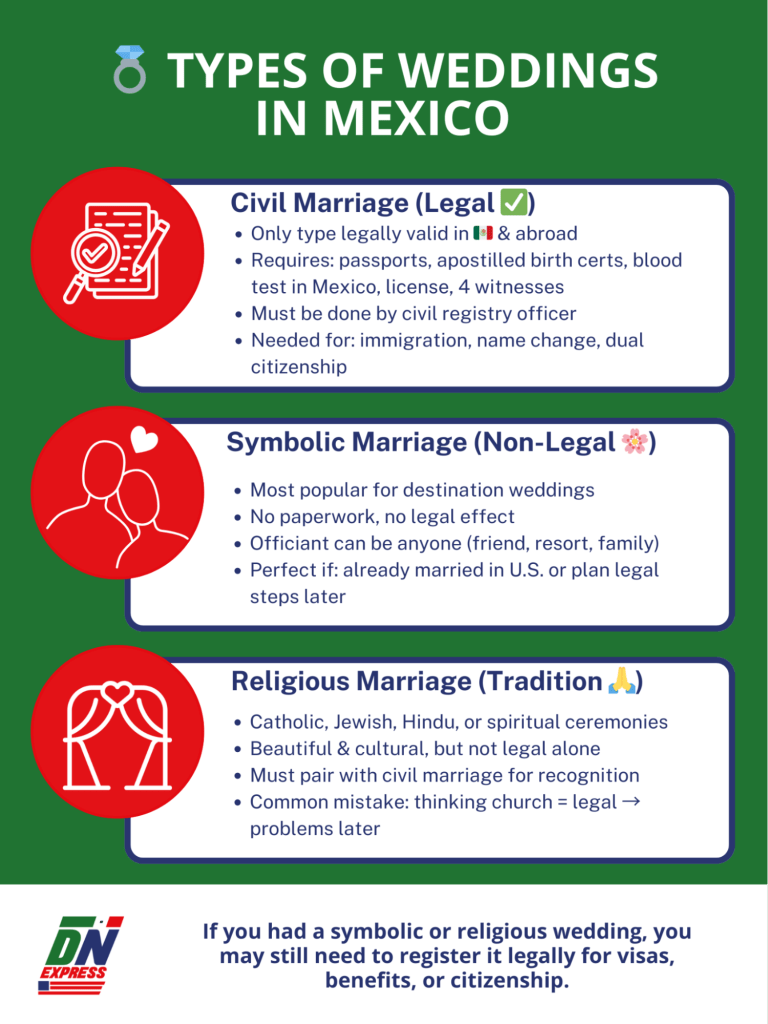
Types of Weddings in Mexico
When people say they're “getting married in Mexico,” they could mean one of three very different things. Only one of which actually holds legal weight.
If you're planning a wedding abroad, especially one that could impact your immigration status, dual citizenship, or name change, it’s vital to recognize the difference between civil, symbolic, and religious weddings.
1. Civil Marriage (Legal)
This is the only type of wedding that is legally recognized in Mexico and internationally. If your goal is to have a valid marriage for legal, immigration, or documentation purposes, this is the route you must take.
To complete a civil marriage in Mexico, you'll need:
- Valid passports and tourist permits (FMM)
- Birth certificates (apostilled and translated)
- A medical exam and blood test done in Mexico
- A marriage license application through the local Registro Civil
- Four adult witnesses with valid ID and tourist cards
Civil ceremonies must be performed by a government-appointed civil registry officer, not a priest, pastor, or resort coordinator.
Most resorts will help coordinate this, but it often requires arriving in Mexico several days early to complete paperwork, testing, and pre-approval.
A civil marriage in Mexico is globally valid, but it must be apostilled and translated if you plan to use it for name changes, U.S. legal filings, or immigration purposes.
2. Symbolic Marriage (Non-Legal)
Symbolic weddings are by far the most popular option for destination weddings in Mexico, and for good reason. They’re emotional, meaningful, and beautifully customizable, but they carry no legal effect.
This option is ideal for couples who:
- Already got legally married in the U.S.
- Plan to do the legal paperwork later
- Want to avoid Mexican blood tests, translations, or registry appointments
Symbolic ceremonies can be officiated by anyone. Your friend, a resort coordinator, or a family member. They can take place anywhere from the beach to a cenote to a rooftop terrace.
No government paperwork is filed. It’s entirely for celebration and personal meaning.
Many of our clients do a symbolic wedding in Mexico, then come to us afterward to help register the marriage (or complete the legal version later) without ever stepping into a consulate.
3. Religious Marriage
From Catholic mass weddings to intimate spiritual ceremonies, religious weddings in Mexico are rich in tradition and culture. They’re not legally binding unless paired with a civil marriage.
Whether you’re planning a Catholic, Jewish, Hindu, or other religious ceremony, you must still go through the Registro Civil to make it official.
Many couples complete the legal paperwork separately, then treat the religious ceremony as the “main” celebration for family and friends.
A frequent mistake is assuming a church wedding is enough for legal recognition, only to find out years later that it was never registered with the government. That oversight can complicate everything from spousal benefits to citizenship applications.
Our team has helped hundreds of couples who did a symbolic or religious wedding first and later realized they needed legal recognition for visa or nationality purposes.
If you’re unsure which type of ceremony you need, we’ll review your documents and help you make the right call from the start, without dealing with the consulate.
Legal Requirements to Get Married in Mexico
If you’re going the legal route, your dream wedding in Mexico comes with some tangible paperwork. Civil marriages require government registration, and every document must be in order.
This step can be smooth if you're prepared, or extremely stressful if you’re not.
Documents Needed for a Legal Civil Marriage
To legally marry in Mexico as a foreigner, you'll need the following:
- Valid Passports and Tourist Cards (FMM). These are required for both partners and all four witnesses.
- Birth Certificates. Must be apostilled in the country of origin and translated into Spanish by a certified translator in Mexico.
- Marriage Application Forms. Completed and submitted at the Registro Civil in the municipality where the wedding takes place.
- Blood Test and Medical Certificate. Both partners must undergo a blood test in Mexico to screen for HIV, STDs, and blood type. Some states also require a chest X-ray.
- Divorce Decree or Death Certificate (if applicable). These documents must also be apostilled and translated if you’ve been married before.
- Four Adult Witnesses. Must be over 18, provide ID, and present valid tourist cards (FMM).
Some cities and resorts may require couples to be present 3–5 business days before the wedding to process paperwork, medical exams, and approvals.
A regular question is, “Why do I need a blood test to get married in Mexico?”
This is not optional. A blood test is a state-mandated requirement designed to identify contagious diseases like HIV or syphilis. It's a relic of older public health laws but still enforced in most states.
The test must be done in a local Mexican clinic, not beforehand in the U.S.
Many U.S. couples feel nervous about this step due to language barriers and unfamiliar medical procedures. Our team often arranges trusted labs and translation to ease the stress.
How quickly can you get married in Mexico? While some resort areas move fast, most locations require 3–5 business days of advance presence for paperwork, blood testing, and interviews. Each state sets its own rules, so be sure to confirm with the Registro Civil in your destination.
Some resorts or municipalities offer expedited services for an extra fee, but always check what's legally valid versus what’s just ceremonial.
💡 Need help getting your documents in order? From apostilles to translations to scheduling your blood test, Doble Nacionalidad Express takes care of everything before you arrive in Mexico. That means no consulate visits, no last-minute scrambles, and no lost paperwork.
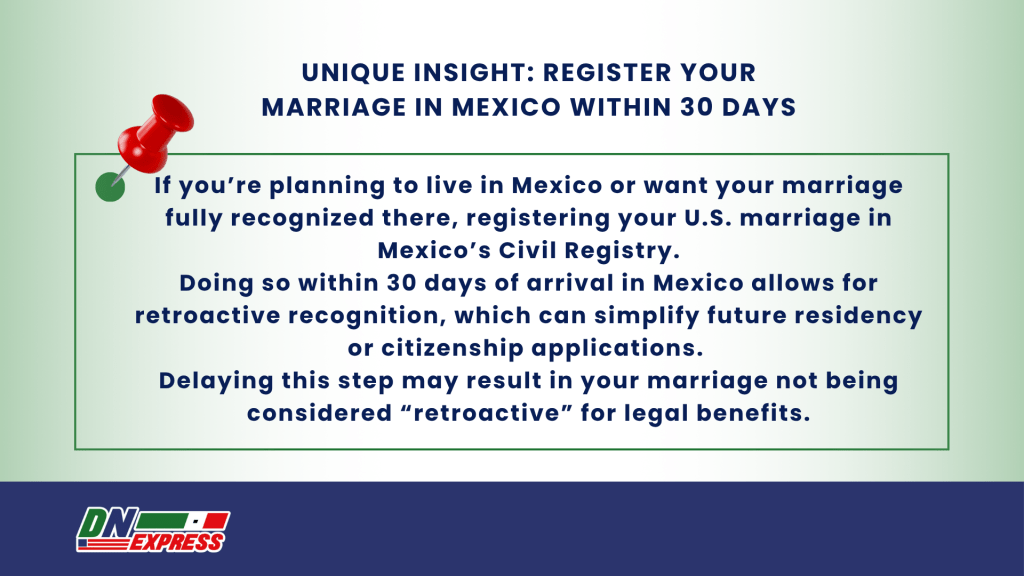
How Much Does It Cost to Get Married in Mexico?
Mexico is known for delivering picture-perfect weddings without the sticker shock. But depending on whether you want a symbolic or legal ceremony, and what your post-wedding goals are, the costs can vary significantly.
Symbolic Ceremony: Affordable, No Legal Fuss
A symbolic wedding in Mexico is often the most budget-friendly option.
- Average Cost: $0–$900. Many resorts include symbolic ceremonies in their all-inclusive wedding packages or offer them at a steep discount.
- No Legal Paperwork Required: You don’t need blood tests, translated documents, or civil registration.
- Total Freedom: Symbolic weddings can be personalized without government restrictions and officiated by anyone you choose.
This is a great option if you've already had a courthouse wedding in the U.S. or want to avoid the legal maze but still celebrate meaningfully in Mexico.
Legal Civil Ceremony: Comes with Hidden Fees
Legal weddings require more steps and more money.
- Base Cost: $1,500–$1,600. This includes the civil registration fee, blood tests, and local registry officer.
- Additional Expenses: $500–$1,000+. This covers document apostilles, certified translations, and courier fees.
These extras often catch couples off guard, especially if they expected the legal route to be straightforward. Many also end up paying for a symbolic ceremony and the legal paperwork separately.
Add-Ons That Increase Cost
Even small extras can add up fast:
- Apostille & Legalization for U.S. Use: Required if you plan to use the marriage certificate for name changes, insurance, or immigration.
- Certified Translator Fees: Not all translators are accepted by Mexican authorities. Using the wrong one can lead to rejected paperwork and redo fees.
- Destination Wedding Perks: Photography, DJs, florals, spa services, and luxury dining from providers found on sites like VisitMexico.com can elevate your day, but also your budget.
Many couples who planned a “cheap” legal wedding in Mexico end up spending more than expected due to last-minute translations, overnight document delivery, or re-doing apostilles.
That’s why so many turn to our team. We quote everything up front and ensure no hidden surprises.
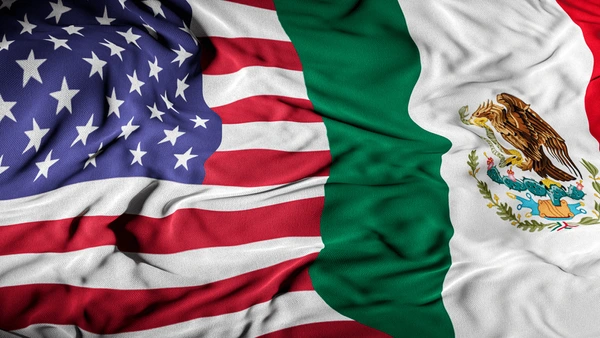
Do You Need to Register Your Marriage in the U.S.?
Yes. If you want your Mexican marriage to carry legal weight in the United States, you need to take extra steps after the ceremony.
While your civil marriage in Mexico is legally valid, it’s not automatically recognized for U.S. administrative purposes like name changes, taxes, insurance, or immigration.
What Needs to Happen After a Legal Mexican Wedding
If you marry civilly in Mexico, you’ll receive a Mexican marriage certificate (acta de matrimonio).
To use that certificate in the U.S., you must:
- Get the Certificate Apostilled. This verifies its authenticity for international use, as established by the Hague Apostille Convention. It must be done by the Mexican government.
- Translate the Certificate into English. The translation must be certified to be accepted by U.S. institutions.
- Submit It to U.S. Agencies. Use the apostilled and translated certificate when updating Social Security, IRS, DMV, health insurance, or USCIS records.
Why This Step Matters
Many couples don’t realize that without this process, their marriage “doesn’t exist” legally in the eyes of the U.S.
That means:
- Name change applications get rejected
- Health benefits may be delayed
- Immigration paperwork could be considered incomplete
- Banks or insurers may require a court order or additional proof
We’ve seen people spend months chasing down delayed certificates, paying double for re-translation, or worse, having to restart the process because a form was filled out incorrectly.
How Our Team Can Help → We walk you through every post-wedding legal step. We handle the apostille, ensure your translation meets both Mexican and U.S. standards, and deliver a legally recognized marriage file you can use immediately. No guesswork, no stress.
Especially if your end goal is dual citizenship, residency, or benefits for your spouse or children, skipping this step is not an option.
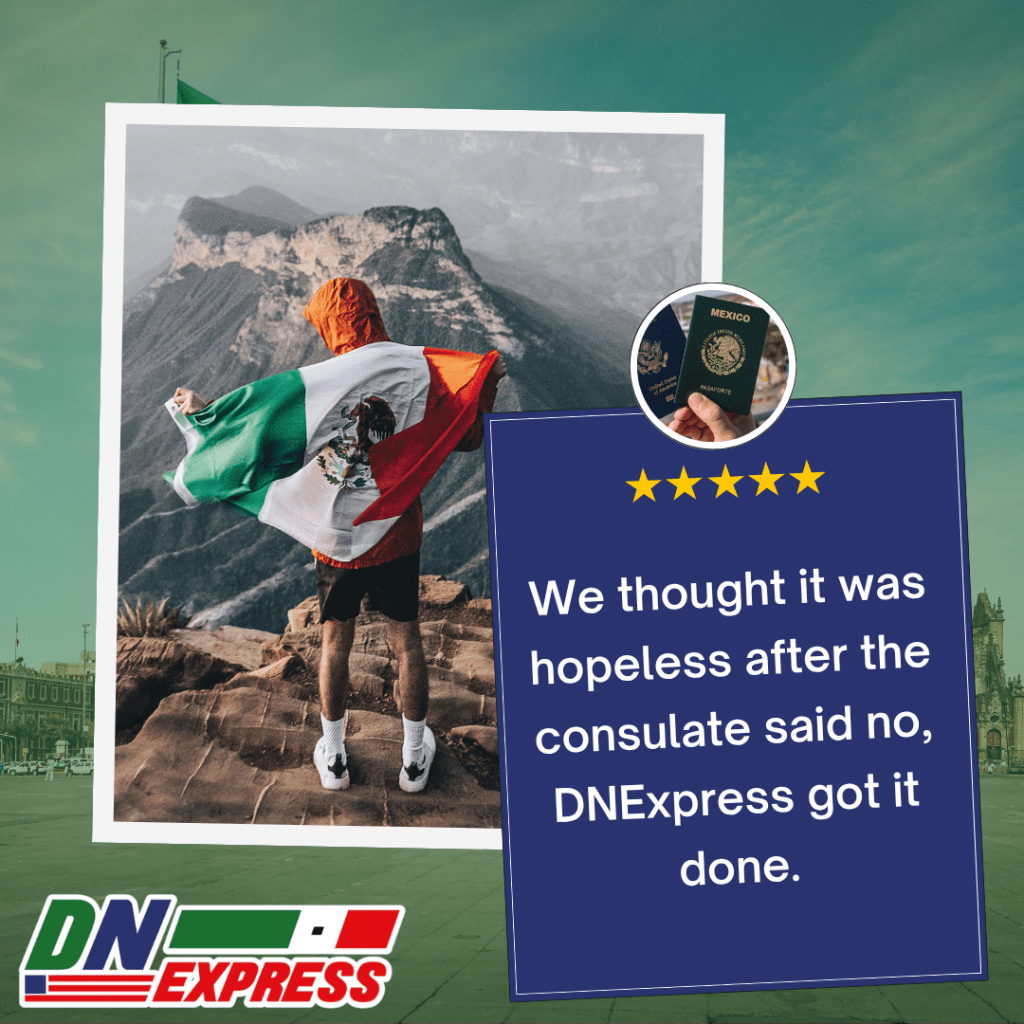
Worries from Couples
Getting married in Mexico can be beautiful and symbolic. It can also be confusing, especially when you're managing cross-border documents, guests, and post-wedding logistics.
These are the questions we hear the most from couples navigating the process.
Name Change Delays
“Can I change my name in the U.S. with a Mexican marriage certificate?”
Yes, but only if you do it right.
To legally change your name using a Mexican marriage certificate, it must be:
- Apostilled by Mexican authorities
- Translated into English by a certified translator
Even then, some U.S. states require an additional court order if the documents aren’t filed exactly as required. We've seen clients have their name change applications denied because of a missing stamp, typo, or formatting issue.
Let us handle this process from start to finish. We know exactly what U.S. agencies are looking for, and we eliminate the risk of rejection due to paperwork issues.
Travel Timing Worries
“Will getting married right before my trip mess up my travel documents?”
Not if you plan smart.
Your marriage certificate does not change your travel ID instantly. If you’re flying soon after your wedding, whether in Mexico or the U.S., book flights under your current legal name.
You can update your passport, Social Security, and license after your marriage is properly recorded and translated. For official guidance, you can consult the U.S. Department of State.
We've helped clients avoid canceled flights or airport issues simply by timing their legal paperwork with their travel plans.
Guest Expectations
“Is it deceptive to have a symbolic wedding?”
Not at all, as long as you're honest.
Symbolic weddings are common and emotionally powerful. They don’t carry legal weight. The issue arises when guests assume it's a legal wedding and later find out otherwise.
The best approach? Be clear with your invitations or vows: “We legally tied the knot already. This is the ceremony where we celebrate with the people we love.” Most guests care far more about sharing your joy than reading your marriage certificate.
Visa Concerns for Mexican Partners
“My fiancée doesn’t have a visa. Can we still marry?”
Yes, you can get married in Mexico even if one partner lacks a U.S. visa.
However, getting married does not guarantee entry into the U.S. afterward.
If your Mexican partner wants to return with you, you’ll need to:
- Apply for a spouse visa or
- Begin an adjustment of status process
This can take time, so don't plan a wedding thinking it will “speed things up” on its own. Marriage is a powerful legal tool, but only when paired with the right immigration steps.
This is where our team shines. We help you navigate legal marriage plus residency or nationality, even if your partner doesn’t qualify for a tourist visa or has been denied before.
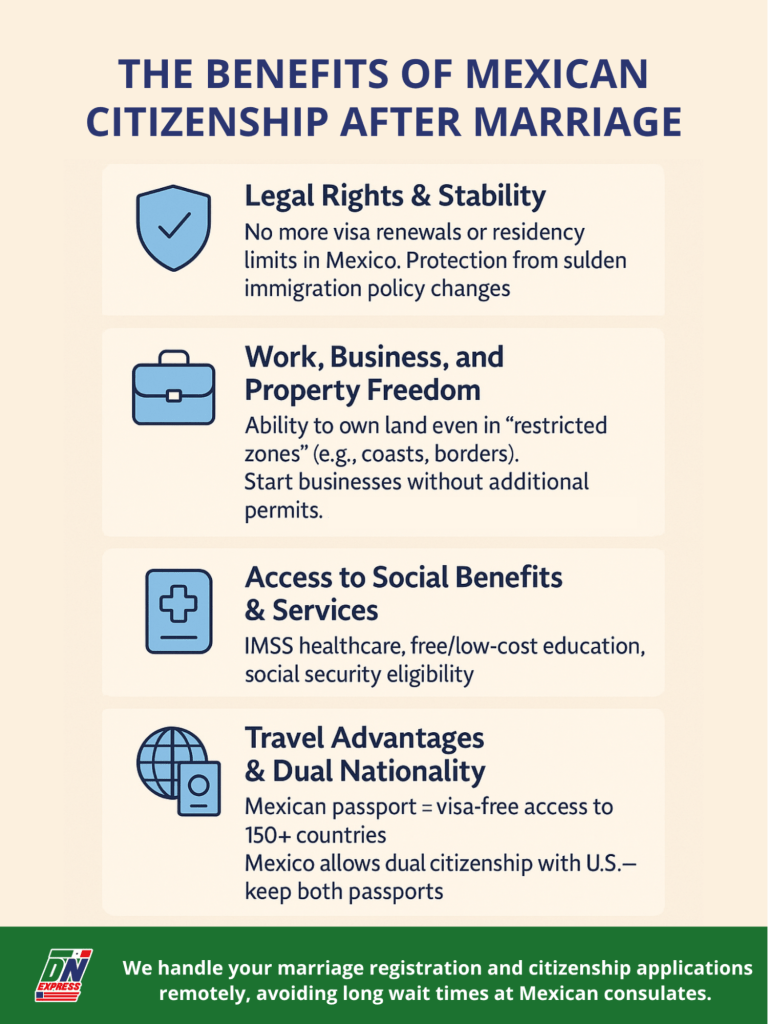
Should You Do It Yourself or Get Legal Help?
Getting married in Mexico requires navigating two countries’ legal systems simultaneously. For some couples, it might seem tempting to handle everything solo.
But for many, the consequences of small mistakes can ripple into years of delays, denials, or lost opportunities.
❌ Doing It Yourself: The Potential Risks
Yes, you might save a few hundred dollars upfront. But most couples who go it alone underestimate how complicated the process can get, especially when their goals extend beyond the wedding itself.
Here’s what to consider:
- Complex Paperwork: Every Mexican state has different marriage requirements, and documentation must be flawless.
- Delays in Document Delivery: Post-wedding certificates can take weeks or months to arrive, and longer if they're sent to the wrong address or get lost in transit.
- Apostille and Translation Risks: Using the wrong apostille authority or hiring a non-certified translator means your documents may be rejected by U.S. agencies.
- U.S.–Mexico Legal Gaps: Marrying abroad touches everything from name changes to immigration status. One wrong move can trigger reapplications, court orders, or denials.
We’ve seen clients attempt the process alone, only to come to us months later, stuck in red tape, frustrated by consulates, and unsure how to fix it.
✅ Working with Our Team: No Consulate, No Surprises
We help binational families and individuals get married legally and use that marriage to unlock residency, citizenship, or dual nationality, all without ever stepping foot in a consulate.
Here’s how we help:
- Avoid the Consulate: We handle your marriage registration and post-wedding paperwork remotely from the U.S.
- Fix Broken Documents: Name mismatches, missing birth certificates, or denied applications? We specialize in solving the issues that stop others cold.
- Cross-Border Legal Expertise: Our licensed, bilingual specialists navigate both U.S. and Mexican systems so you don’t have to.
- Citizenship, Residency, and Beyond: If your marriage is part of a bigger plan, like passing nationality to your kids or securing legal status for a spouse, we connect every legal dot.
A key benefit: Our team regularly helps people who’ve already been rejected by consulates or overwhelmed by DIY attempts. We give them a path forward and peace of mind that it’s done right.
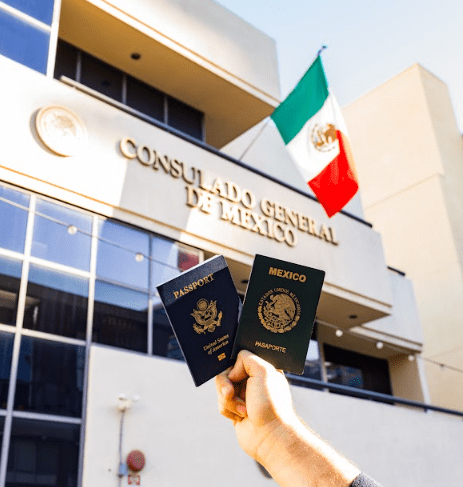
Marriage and Mexican Citizenship
Getting married in Mexico, or to a Mexican citizen, can open doors to residency and even citizenship. But contrary to popular belief, marriage by itself does not automatically grant nationality.
It’s part of a longer legal journey that must be approached correctly.
Can You Get Citizenship by Marriage?
Yes, but not overnight.
If you marry a Mexican citizen, you can apply for temporary residency. After two years of uninterrupted legal residency in Mexico based on your marriage, you're eligible to apply for naturalization as a Mexican citizen.
However, this process includes:
- Proof of a genuine and ongoing relationship
- Legal residency status throughout the entire period
- A clean legal record
- Basic Spanish proficiency and knowledge of Mexican history and culture
Some couples get caught up in tourist visas, thinking marriage shortcuts the system. It does not.
What Happens if a U.S. Citizen Marries a Mexican Citizen?
Marriage opens the door to:
- Temporary residency in Mexico (good for 1 year, renewable)
- Eventually permanent residency, with no need to leave the country
- Eligibility for Mexican citizenship after 2 years
But this process is governed by Mexican immigration law, not the act of marriage. If your goal is dual nationality, you must legally register the marriage and maintain proper immigration status during the process.
This is where most people get stuck, especially those trying to do it on their own. They assume marriage is the “end step,” when it’s the beginning of a legal path.
Our Team Can Guide You Through Every Step. Whether your goal is Mexican citizenship, residency, or correcting your legal identity, Doble Nacionalidad Express knows how to turn your marriage into legal momentum, without wasting time on consular backlogs or risky DIY strategies.
We help you:
- Register your marriage properly for use in Mexico or the U.S.
- Apply for residency without errors that trigger rejections
- Transition to citizenship through the proper legal channels

Final Thoughts: Why Get Married in Mexico?
There’s a reason so many couples, especially Mexican-Americans, choose to say “I do” south of the border.
Whether it’s a symbolic beach ceremony or a legally binding civil wedding, Mexico offers:
- Breathtaking locations from Riviera Maya to Oaxaca
- Affordable wedding packages that rival U.S. costs
- A deep connection to Mexican roots for you and your family
- Tangible legal advantages when it comes to residency, immigration, or reclaiming citizenship
For many, getting married in Mexico is a celebration and a legal milestone that impacts their identity, travel rights, and family future.
But here’s the truth: unless you’re keeping things symbolic, don’t handle it yourself. The paperwork is complex. The requirements change by state. And one missed stamp, mistranslated form, or consulate delay can have significant costs.
If your goals include:
- Legal recognition in the U.S. or Mexico
- Changing your name
- Applying for dual citizenship
- Registering your U.S.-born children in Mexico
- Or helping your spouse obtain legal status…
👉 Doble Nacionalidad Express can help you do it right, the first time. We’ve helped thousands of couples get married, get recognized, and get the future they deserve, without stepping foot in a consulate.
📞 Talk to Our Team About Your Cross-Border Marriage Plans. Have you been turned down by a consulate? Stuck with missing documents, name mismatches, or denied applications?
Planning to use your marriage as a path to:
- Dual citizenship?
- Mexican residency?
- Registering your U.S.-born children in Mexico?
We help binational couples and Mexican-American families turn complicated legal processes into smooth success stories, without ever stepping foot in a consulate.
👉 Schedule a Free Case Review or Message Us on WhatsApp
Let’s make your marriage mean more. Legally, culturally, and personally.
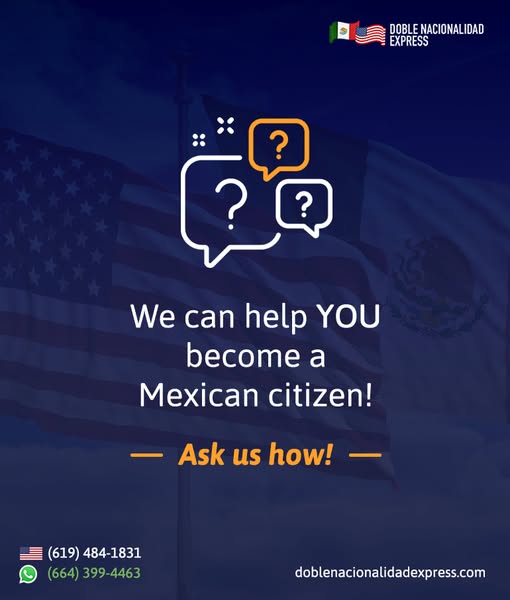
Frequently Asked Questions About Getting Married in Mexico
Can U.S. citizens legally get married in Mexico?
Yes, as long as you meet the legal requirements for a civil ceremony. This includes paperwork, blood tests, and four witnesses.
Is a Mexican marriage valid in the U.S.?
Yes, but you must apostille and translate the marriage certificate before using it for name changes, immigration, or legal purposes in the U.S., a process detailed by institutions like the U.S. Embassy in Mexico.
What’s the difference between a civil and symbolic wedding?
Civil weddings are legally binding. Symbolic weddings are ceremonial only and do not require legal documents or medical tests.
Do I need to register my Mexican marriage in the U.S.?
Not automatically, but if you want to change your name, apply for spousal benefits, or adjust status, you must register it properly with U.S. agencies.
How long does it take to get legally married in Mexico?
Most couples need to arrive 3–5 business days before the wedding to complete paperwork, medical tests, and civil registry requirements.
Can I get Mexican citizenship through marriage?
Yes, after two years of legal residency in Mexico as the spouse of a Mexican citizen, you can apply for naturalization. It is not automatic.



